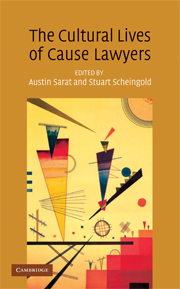Book contents
- Frontmatter
- Contents
- Acknowledgments
- Contributors
- Bringing Cultural Analysis to the Study of Cause Lawyers: An Introduction
- PART I THE CULTURAL WORK OF CAUSE LAWYERS
- 1 “No sacrifice is too great for the Cause!”: Cause(less) Lawyering and the Legal Trials and Tribulations of Gone With the Wind
- 2 Purpose-Driven Lawyers: Evangelical Cause Lawyering and the Culture War
- 3 Cause Lawyers and Cracker Culture at the Constructive Edge: A “Band of Brothers” Defeats Big Tobacco
- PART II THE CULTURAL CONSTRUCTION OF LAWYERS AND THEIR CAUSES
- PART III THE CULTURAL RECEPTION OF LAWYERS AND THEIR CAUSES
- Index
1 - “No sacrifice is too great for the Cause!”: Cause(less) Lawyering and the Legal Trials and Tribulations of Gone With the Wind
Published online by Cambridge University Press: 08 January 2010
- Frontmatter
- Contents
- Acknowledgments
- Contributors
- Bringing Cultural Analysis to the Study of Cause Lawyers: An Introduction
- PART I THE CULTURAL WORK OF CAUSE LAWYERS
- 1 “No sacrifice is too great for the Cause!”: Cause(less) Lawyering and the Legal Trials and Tribulations of Gone With the Wind
- 2 Purpose-Driven Lawyers: Evangelical Cause Lawyering and the Culture War
- 3 Cause Lawyers and Cracker Culture at the Constructive Edge: A “Band of Brothers” Defeats Big Tobacco
- PART II THE CULTURAL CONSTRUCTION OF LAWYERS AND THEIR CAUSES
- PART III THE CULTURAL RECEPTION OF LAWYERS AND THEIR CAUSES
- Index
Summary
Introduction: “ … fighting on the field. Fighting for the Cause” (GWTW, DVD): Gone with the Wind's Adversarial Ashley Wilkeses and the Cause of the Confederacy
“Ashley's fighting on the field. Fighting for the cause. He may never come back. He may die. Scarlett, we owe him a well-born child.” So goes an extract of dialogue from one of the lesser known scenes from a very well-known, in fact overexposed American movie classic. The speaker is that filmic voice of oratorical conscience, Dr. Meade, a character played by Broadway stalwart, Harry Davenport. His auditor is Southern belle extraordinaire (and survivor par excellent), Scarlett O'Hara, aka Hamilton, aka Kennedy, aka Butler, a role taken by the British ingenue – at least for U.S. audiences at the time – Vivien Leigh. And the film? Naturally, King Vidor's 1939 adaptation of Margaret Mitchell's Pulitzer Prize winner, Gone with the Wind. Now anyone familiar with the movie – and is there anyone out there who isn't? – knows (or should know) that Scarlett's acquiescence here owes more to promises previously rendered than to Dr. Meade's persuasive power. In an earlier scene – now recalled in hindsight (“I promised Ashley … something”) – Scarlett had vowed to her thwarted love interest, Ashley Wilkes, that she would take care of his frail wife, the gentle and kindly Melanie.
- Type
- Chapter
- Information
- The Cultural Lives of Cause Lawyers , pp. 27 - 55Publisher: Cambridge University PressPrint publication year: 2008



